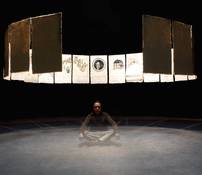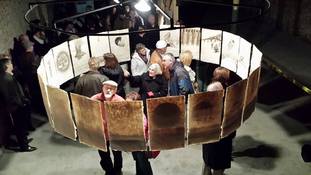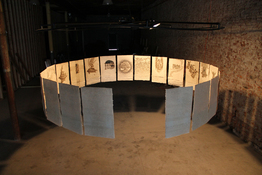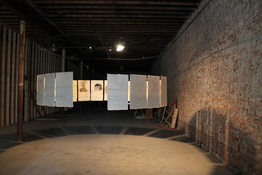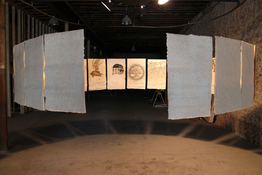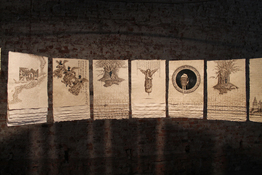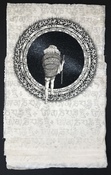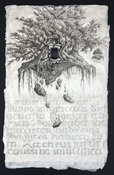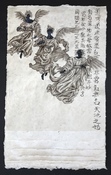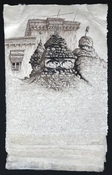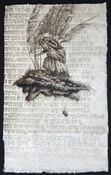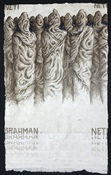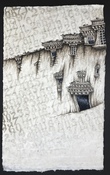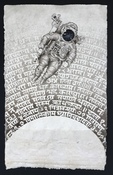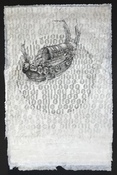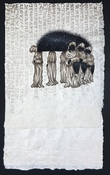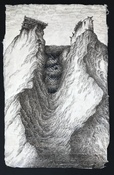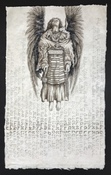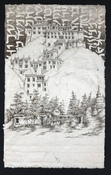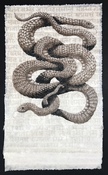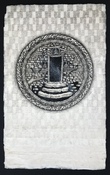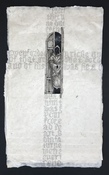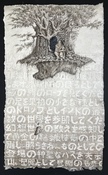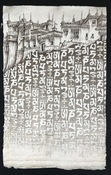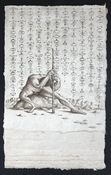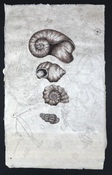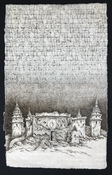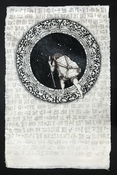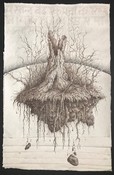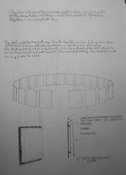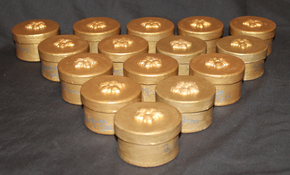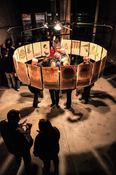Pages From The Manual On Dismantling God:
Creating each page of this installation was a process of rediscovering the imagery from 30 years of work as a conceptual artist. Some pieces are based on location drawings completed in India and Tibet. The text not only incorporates current, ancient, and sacred languages from Devanigari Sanskrit to Peshitta Aramaic; from modern Greek and Tibetan to futuristic Vulcan; from binary code to musical notation, but also offers passages from the Dead Sea Scrolls, Old and New Testaments, Bhagavad Gita, Upanishads, Buddhist texts, and modern physics.
As an archetype of universality and wholeness, the circular form of the installation gives viewers a portal to enter, so they can move toward the center of the mandala and the interior of the “artspace” itself. To create a sacred space, 21 pages numbered in primes are hung as a result of chance after casting the I-Ching.
Each work has seven layered pages—seven being the archetype of completeness. The length and width of each piece is phi, the ratio 1.618, known as the enigmatic Golden Ratio. The paper—handmade from the Daphne plant of the Himalayan foothills and used by Buddhists for their woodblock printed prayer books and mantras—was transported from Nepal to my studio for this artwork.
This installation binds the old with the new world in its content, materials, and a vision that everything moves toward the center.
This installation investigates the possibility of breaking down pervasive dichotomies between thought and reality, self and other. When viewers read visual elements intuitively rather than literally, the mind is awakened to its relationship to the world. Unimpeded by preconceptions, interpretations, or meaning—the mind is free to experience the unfolding present. Thus, a more primal, holistic experience that dismantles perception can occur in each moment of life or when viewing artwork.
Creating each page of this installation was a process of rediscovering the imagery from 30 years of work as a conceptual artist. Some pieces are based on location drawings completed in India and Tibet. The text not only incorporates current, ancient, and sacred languages from Devanigari Sanskrit to Peshitta Aramaic; from modern Greek and Tibetan to futuristic Vulcan; from binary code to musical notation, but also offers passages from the Dead Sea Scrolls, Old and New Testaments, Bhagavad Gita, Upanishads, Buddhist texts, and modern physics.
As an archetype of universality and wholeness, the circular form of the installation gives viewers a portal to enter, so they can move toward the center of the mandala and the interior of the “artspace” itself. To create a sacred space, 21 pages numbered in primes are hung as a result of chance after casting the I-Ching.
Each work has seven layered pages—seven being the archetype of completeness. The length and width of each piece is phi, the ratio 1.618, known as the enigmatic Golden Ratio. The paper—handmade from the Daphne plant of the Himalayan foothills and used by Buddhists for their woodblock printed prayer books and mantras—was transported from Nepal to my studio for this artwork.
This installation binds the old with the new world in its content, materials, and a vision that everything moves toward the center.
This installation investigates the possibility of breaking down pervasive dichotomies between thought and reality, self and other. When viewers read visual elements intuitively rather than literally, the mind is awakened to its relationship to the world. Unimpeded by preconceptions, interpretations, or meaning—the mind is free to experience the unfolding present. Thus, a more primal, holistic experience that dismantles perception can occur in each moment of life or when viewing artwork.
Pages From The Manual On Dismantling God
Page 2 Prime: Variation 2: Pages From The Manual On Dismantling God
2019
Ink and Gouache on Handmade Himalayan Daphne Paper
16" x 26"
Sold
2019
Ink and Gouache on Handmade Himalayan Daphne Paper
16" x 26"
Sold
Image: As we treked up to Thyangboche Monastery, we followed behind this Nepali who was carrying prayer stones and gaining spiritual merit in the process. Background text is a mantra in Tibetan script, "praise the jewel in the lotus."
Page 5 Prime: Pages From The Manual On Dismantling God
2013
Ink and Gouache on Handmade Himalayan Daphne Paper
16" x 26"
$1200 unframed
2013
Ink and Gouache on Handmade Himalayan Daphne Paper
16" x 26"
$1200 unframed
Image: Ascending angels were inspired by the handcarved angels from the Christmas tree at the Metropolitan Musem. The areas where there would be flesh is now a motif of space, "the final frontier."
The Chinese text is the first chapter from the Tao Te Ching by Lao Tzu.
The Chinese text is the first chapter from the Tao Te Ching by Lao Tzu.
Page 7 Prime: Pages From The Manual On Dismantling God
2013. Updated 2019
Ink and Gouache on Handmade Himalayan Daphne Paper
16" x 26"
$1200 unframed
2013. Updated 2019
Ink and Gouache on Handmade Himalayan Daphne Paper
16" x 26"
$1200 unframed
Image: Leh Monastery, Ladakh. Originally, I drew this view on location.
The text is from the oldest surviiving copy of the Christian Gospels in Arabic translation, late 8th C. St Catherines Monastery of the Sinai, Egypt. From the Palimpests Project, earliest known Arabic Gospel over medical text or the 5th C.
The text is from the oldest surviiving copy of the Christian Gospels in Arabic translation, late 8th C. St Catherines Monastery of the Sinai, Egypt. From the Palimpests Project, earliest known Arabic Gospel over medical text or the 5th C.
Page 11 Prime: Pages From The Manual On Dismantling God
2013. Updated 2019
Ink and Gouache on Handmade Himalayan Daphne Paper
16" x 26"
$1200 unframed
2013. Updated 2019
Ink and Gouache on Handmade Himalayan Daphne Paper
16" x 26"
$1200 unframed
I spent a day on a nearby ridge above Thyangboche Monastery in the Himalayas during a prayer ceremony on a shrine. This monk is planting prayer flags into the top of the shrine while the surrounding monks chant a prayer to "emptiness." The background text is from the beginning of theUpanishads, Chapter 1 in Sanskrit.
Page 13 Prime: Pages From The Manual On Dismantling God
2013, Updated 2019
Ink and Gouache on Handmade Himalayan Daphne Paper
16" x 26"
$1200 unframed
2013, Updated 2019
Ink and Gouache on Handmade Himalayan Daphne Paper
16" x 26"
$1200 unframed
Image: Inspired by spending a few days on the Ganges River at Varanasi. These are figures that were wrapped for cremation on the gats on the edge of the river. In this context, they represent humanity in general. The sankrit transliteration text; Neti, neti, Brahmin, neti, "Not this, not that, not anything the rational mind can concieve of."
Page 23 Prime: Pages from the Manual on Dismantling God. Variation 1
2018. Updated 2019
Ink and Gouache on Handmade Himalayan Daphne Paper
16" x 26"
$1200 unframed
2018. Updated 2019
Ink and Gouache on Handmade Himalayan Daphne Paper
16" x 26"
$1200 unframed
Chinese boat (small junk) traveling through life.
Background text is binary code for some of the names of God that begin with the letter "B."
Background text is binary code for some of the names of God that begin with the letter "B."
Page 29 Prime: Pages from the Manual on Dismantling God
2013. Updated 2019
Ink and Gouache on Handmade Himalayan Daphne paper
16" x 26"
$1200 unframed
2013. Updated 2019
Ink and Gouache on Handmade Himalayan Daphne paper
16" x 26"
$1200 unframed
Image: Originally, I drew this on location from a sculpture at the Louve' in Paris, 1988. The tomb of Phillipe Pott. The motif of outerspace represents inner or spiritual space, "the final frontier." Coptic script, New Testiment from the Gospel of Matthew.
Page 31 Prime: Pages from the Manual on Dismantling God
2013. Updated 2019
Ink on Handmade Himalayan Daphne Paper
16" x 26"
$1200 unframed
2013. Updated 2019
Ink on Handmade Himalayan Daphne Paper
16" x 26"
$1200 unframed
Lamayuru Monastery, Ladakh. We spent several nights here. The original location drawing was done from the lower cliff, beneith the monastey.
The text is binary code representing a few of the names of God that begin with the letter B.
The text is binary code representing a few of the names of God that begin with the letter B.
Page 41 Prime: Pages From The Manual On Dismantling God, Variation 1
2019
Ink and Gouache on Handmade Himalayan Daphne Paper
16" x 26
$1200 unframed
2019
Ink and Gouache on Handmade Himalayan Daphne Paper
16" x 26
$1200 unframed
Image: Tikse Monastery, Ladakh, with Tibetan Script; Original drawing on location in Ladakh in 1990's.
Text. Gospel of St. Mark from an Irish Prayer book in Gaelic script.
Text. Gospel of St. Mark from an Irish Prayer book in Gaelic script.
Page 59 Prime: Pages from the Manual on Dismantling God
2013. Updated 2019
Ink and Gouache on Handmade Himalayan Daphne Paper
16"x 26"
$1200 unframed
2013. Updated 2019
Ink and Gouache on Handmade Himalayan Daphne Paper
16"x 26"
$1200 unframed
Hindu Temple in the village of Bhaktipur, Kathmandu Valley with a sleeping man sitting on the door step. The man represents all of humanity sleeping as the door to enlightenment sits open for them to enter at any time.
The text is in Japanese script and is the Buddhist story of the "Broken Teacup."
The text is in Japanese script and is the Buddhist story of the "Broken Teacup."
Page 61 Prime: Pages From The Manual On Dismantling God
2013 Updated 2019
Sepia Ink and Gouache on Handmade Himalayan Daphne Paper
16" x 26" unframed
$1200 unframed
2013 Updated 2019
Sepia Ink and Gouache on Handmade Himalayan Daphne Paper
16" x 26" unframed
$1200 unframed
Sabu Monastery, Ladakh. I made several location drawings of this monastery in Ladakh. Tibetan script -- Mantra, Om Mani Padmi Hum. Praise the Jewel in the center of the Lotus Blossom.
Page 67 Prime: Pages From The Manual On Dismantling God
2013 Updated 2019
Sepia Ink on handmade Himalayan Daphne paper
16" x 26
$1200 unframed
2013 Updated 2019
Sepia Ink on handmade Himalayan Daphne paper
16" x 26
$1200 unframed
Foreground Figure: Man in conflict with himself. Vulcan language. Last words of a dying Vulcan whom, uncharacteristicaly, speaks about his family and the beauty of nature. I am attracted to good science fiction films. Also, ficticious languages are just a legitimate to me as any other language.
Page 71 Prime: Pages From The Manual On Dismantling God
2019
Sepia Ink on Handmade Himalayan Daphne Paper
16" x 26
$1200 unframed
2019
Sepia Ink on Handmade Himalayan Daphne Paper
16" x 26
$1200 unframed
Page 71 Prime: Pages From The Manual On Dismantling God: Sepia Ink on Handmade Himalayan Daphne Paper. 16" x 26". Much of my philosophy regarding art and the creative process is based on Paleolithic and Neolithic imagery found on cave walls and in tribal cultures. In this work, I've used a few of those images that were found in France, Spain and early Native American societies. The shells in the foreground reflect the spiral as an archetype of our movement through life/pilgrimage. There is also the element of the growth ratio, 1.618 (the Golden Ratio) within each shell. This is a natural growth cycle in nature and represents the growth of our awakening consciousness.
Page 73 Prime: Pages From The Manual On Dismantling God
2013. Updated 2019
Sepia Ink on Handmade Himalayan Daphne Paper
16" x 26"
$1200 unframed
2013. Updated 2019
Sepia Ink on Handmade Himalayan Daphne Paper
16" x 26"
$1200 unframed
Image: Toling Monastery, Ladakh. We spent a week in the Guge canyon region of Western Tibet where I did a number of location drawings
Text: Bagavad Gita. Sanskrit. Chapter 1
Text: Bagavad Gita. Sanskrit. Chapter 1
Page 2 Prime
2019
Ink & gouache on handmade Himalayan Daphne paper
26" x 16"
$1200 unframed
2019
Ink & gouache on handmade Himalayan Daphne paper
26" x 16"
$1200 unframed
This is a figure I used in a painting a few years ago entitled, “Walking the Dogma.” In this piece, instead of a Buddhist prayer, a working formula describing unified field theory is carved into the stone. The figure moves toward the mandala, a symbol of sacred space, the space of awakening.
The background text is the oldest known written language, Sumerian, which dates back to 3500 BCE.
The image explores the human struggle to find meaning. Perhaps the contrasting languages signifies a difference between knowledge and wisdom or belief and truth.
The drawing is on seven sheets of handmade Himalayan Daphne paper, the same paper used for Buddhist prayer books and prayer flags. Each overlapping page is torn to the ratio of 1.618.
The background text is the oldest known written language, Sumerian, which dates back to 3500 BCE.
The image explores the human struggle to find meaning. Perhaps the contrasting languages signifies a difference between knowledge and wisdom or belief and truth.
The drawing is on seven sheets of handmade Himalayan Daphne paper, the same paper used for Buddhist prayer books and prayer flags. Each overlapping page is torn to the ratio of 1.618.
Page 89 Prime: Pages from the Manual on Dismantling God
2020
#41 Noodlers Brown ink on archival handmade Himalayan Daphne paper
16"x 26 unframed
Sold
2020
#41 Noodlers Brown ink on archival handmade Himalayan Daphne paper
16"x 26 unframed
Sold
Image: During the three-week Ohio quarantine in the spring, I tried to make a drawing every day in the woods next to our cottage. I drew this tree remnant on May 2nd in my sketchbook and called it “Monument.” In this image I’ve iconized it into a deity-like form influenced by the Tibetan tangka paintings.
Text: Sanskrit from the Veda’s: “Those whose awareness is not open to this field, what can the sound of the Veda accomplish for them? Those who know this level of consciousness are established in unity, wholeness of life.”
Text: Sanskrit from the Veda’s: “Those whose awareness is not open to this field, what can the sound of the Veda accomplish for them? Those who know this level of consciousness are established in unity, wholeness of life.”
Hanging Plan
Graphite on paper
11" x 14" from the full sketchbook
NFS
Graphite on paper
11" x 14" from the full sketchbook
NFS
Many preliminary drawings were created for this installation. Although this series can be hung in a traditional wall setting as well. Ideally, the work would be hung unframed in the circle as an installation. This is a view of the plan for mounting the pages. The viewer will walk inside of the 13 foot circle.
Reliquia Dei
2013
Cardboard, wood, paint, mustard seed, Himalayan paper
1 1/2" x 2 1/2"
NFS
2013
Cardboard, wood, paint, mustard seed, Himalayan paper
1 1/2" x 2 1/2"
NFS
These relics were given away at the first exhibition opening when the work. The boxes are signed and numbered in primes to infinity. Inside is a single mustard seed and a universal peace mantra written on a piece of Himalayan paper. The boxes are sealed. The boxes were smudged and consecrated in a Native American church.

